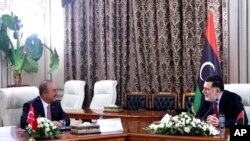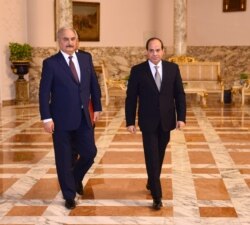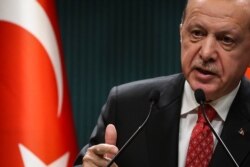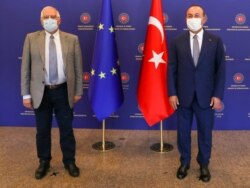The Egyptian parliament’s decision Monday to authorize the possible deployment of Egyptian troops in Libya is highlighting concerns in the region about a possible escalation of the Libyan conflict. International pressure is, meanwhile, growing on Turkey over its involvement as Ankara doubled down on its support of Libya’s Government of National Accord, fueling fears of a wider a regional war.
After a phone conversation Monday, President Donald Trump and Egyptian President Abdel-Fattah al Sissi added their voices to growing international calls for a Libyan ceasefire.
"The two leaders affirmed the need for immediate de-escalation in Libya, including through a ceasefire and progress on economic and political negotiations," the White House said in a statement.
Last week the European Union also called for an end to hostilities.
The ceasefire calls come as GNA forces backed by Turkey are poised to attack the strategically important town of Sirte, which is the gateway to much of Libya's vast energy reserves.
In January, Turkey started sending military personnel to Libya in support of the Tripoli-based GNA. The GNA has been under sustained attack from forces led by Libyan General Khalifa Haftar, who has a power base in eastern Libya. Haftar's Libyan National Army has the backing of countries such as the United Arab Emirates, Egypt, and Russia.
The Turkish intervention turned the tide in the conflict, with Haftar forces suffering heavy losses. Alarmed by this reversal, Cairo is looking to intervene.
Widening conflict
On Monday, the Egyptian parliament voted to allow President Abdel-Fattah el-Sissi to order Egyptian military intervention in Libya.
Turkish President Recep Tayyip Erdogan, Friday pledged "never to abandon the Libyan people," claiming a new agreement deepening cooperation with Tripoli will be signed soon.
Ankara has so far not responded to Trump's call for a ceasefire. But geo analyst Yoruk Isik says Trump's intervention is unlikely to end the fighting immediately.
"Ankara will say this is wonderful. I want a ceasefire. But the Trump statement is not necessarily saying I want a ceasefire tomorrow," said Isik.
"If Trump were to call Erdogan and demand an immediate ceasefire, it would, of course, be different. But I don't think that call will happen because Turkey stopping right at this moment, means the Russians will retain the upper hand in Libya, and Washington doesn't want a ceasefire with the Russians fully settling in Libya."
Moscow officially denies militarily supporting Haftar, but a UN report in May said approximately 1,200 Russian mercenaries with the Wagner Group were backing the Libyan warlord. The Wagner Group is a private security force run by Yevgeny Prigozhin; a businessman reported to have close ties to Russian President Vladimir Putin.
Since the end of World War Two, Russia has sought to put Libya under its sphere of influence. Currently, observers say Moscow seeks new naval bases beyond Syria in the Mediterranean.
"Turkey wants to control the Sirte region and then Ankara will agree to a ceasefire, probably the Russians are not happy about that," said Ilhan Uzgel, a political analyst.
Cairo’s moves to intervene are a complicating factor.
"I think given how big the Egyptian army is, and it's the advantageous geographical position [bordering Libya] they [Ankara] should be worried," said Isik.
"But militarily Ankara is aware Egypt is seven months late to take this military threat position. If they took this decision before the Turkish operations started, this threat would be credible. But Turkey is already established in Tripoli; they are applying final touches to turn [Libya's] Al Al-Watiyah [airfield] into a full-fledged Turkish air force base. They have also almost completed a naval base in Misrata."
Isik also says Ankara is likely calculating that the Egyptian army would be wary of carrying out a significant operation deep into Libya.
"Egypt doesn't have the experience it been decades since carrying out major cross border operations, also Ankara is calculating that Cairo doesn't have the political will for such a move."
Europe
Alarmed at the prospect of seeing the Libyan civil war escalate into a regional conflict, the leaders of France, Germany, and Italy issued a thinly veiled warning to Ankara over its military backing of the GNA.
"We are ready to consider the possible use of sanctions if the breaches of the [UN Libyan Arms] embargo at sea, on land or in the air continue," read a joint statement.
Ankara is aware previous EU sanction threats rarely result in meaningful measures, given Turkey's strategic importance.
"If there are any sanctions, they would target individuals active in Libyan affairs, such as military commanders and, or businesspeople suspected of intermediating the military aid to the GNA, and not Turkey at large. Thus, they will probably be symbolic," said consultant Atilla Yesilada of Global Source Partners.
Fueling the conflict
Some European diplomats, speaking anonymously to the international media, are also voicing unease that Turkey appears to be the only country targeted for criticism for supplying arms to Libya, a concern shared by Washington, while others have been doing so as well.
"They could at least if they were serious, I think, call them out -- call out all parties in the conflict when they violate the arms embargo," David Schenker, assistant secretary for Near East Affairs at the State Department, said Thursday.
Egypt, United Arab Emirates, and Russia are all suspected of supplying arms to Haftar's forces.
Despite growing international pressure, Ankara believes it has a winning hand in Libya, calculating that no country is ready to confront the situation directly.
Analyst Uzgel warns of the dangers of overconfidence.
"There is a kind of hubris self-indulgence. Sometimes this may lead them (Turkish leaders) to make serious mistakes as they've done in the past."









